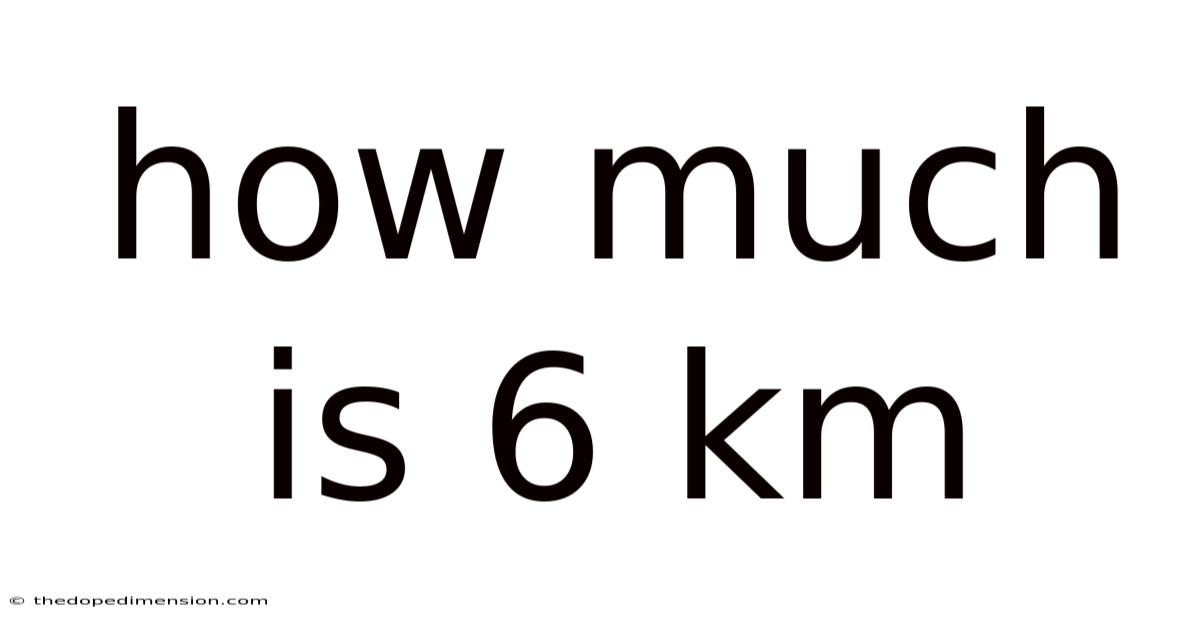How Much Is 6 Km
thedopedimension
Sep 06, 2025 · 4 min read

Table of Contents
How Much is 6 Kilometers? Understanding Distance and its Context
Knowing how much 6 kilometers is isn't just about a number; it's about understanding distance in a practical, relatable way. This article will explore the concept of 6 kilometers, providing various perspectives to help you visualize and appreciate this unit of measurement. We'll cover everything from everyday comparisons to scientific contexts, ensuring you grasp the significance of this distance regardless of your background.
Introduction: 6 Kilometers - A Measure of Distance
Six kilometers (6 km) represents a significant distance, particularly when considering everyday activities. While it might seem abstract, understanding 6 km requires translating it into relatable contexts. This article aims to do just that, providing multiple comparisons, examples, and explanations to solidify your understanding. We'll delve into practical examples, scientific implications, and even address frequently asked questions to make the concept of 6 kilometers crystal clear.
Visualizing 6 Kilometers: Real-World Comparisons
The best way to understand 6 km is through comparisons to familiar distances. Here are some examples to help you visualize:
- Walking: A brisk walk at a pace of 5 km/hour would take you approximately 72 minutes, or just over an hour, to cover 6 kilometers. This provides a good perspective on the exertion involved.
- Running: A moderate run might take you between 45 and 60 minutes to complete 6 kilometers, depending on your fitness level.
- Cycling: Cycling at a moderate speed, 6 kilometers is a relatively short distance, taking you between 15-25 minutes.
- Driving: In a car, 6 kilometers is a short trip – possibly the distance between two nearby suburbs or a short commute.
- Geographical Context: 6 kilometers might represent the radius of a small town or village, or the distance between neighboring landmarks in a city.
These examples illustrate the variability of the time it takes to cover 6 km, depending entirely on the mode of transportation and individual speed.
6 Kilometers in Different Contexts
The significance of 6 kilometers varies greatly depending on the context. Here are some examples:
- Sports and Fitness: In running or cycling, 6 kilometers represents a moderate distance, often used in training plans or shorter races. In swimming, 6 kilometers is a considerable distance, generally covered only by serious long-distance swimmers.
- Travel and Commute: For daily commutes, 6 kilometers might be a manageable distance, particularly in urban areas with efficient public transport. However, in rural areas, 6 kilometers could represent a significant journey.
- Navigation and Mapping: On a map, 6 kilometers is a relatively short distance, easily traversed on foot or by bicycle within a reasonable timeframe.
- Hiking and Trekking: On a hiking trail, 6 kilometers is a manageable distance for a moderately fit individual, though elevation changes and terrain can influence travel time significantly.
- Aerial Perspective: From an aerial perspective, 6 kilometers appears as a relatively small area, easily surveyed by drone or low-flying aircraft.
Scientific Understanding of Distance and Measurement
Understanding 6 kilometers requires delving slightly into the scientific principles of measurement. The kilometer (km) is a unit of length in the metric system, equivalent to 1000 meters (m). This system is based on powers of 10, making conversions straightforward. The concept of distance is fundamental in physics, used in various calculations involving speed, time, and displacement.
The formula that connects these three elements is:
Speed = Distance / Time
Using this formula, we can calculate speed, distance, or time if two of the variables are known. For example, if you know you covered 6 kilometers in 30 minutes (0.5 hours), you can calculate your average speed as:
Speed = 6 km / 0.5 hours = 12 km/hour
Understanding the relationship between these three factors provides a comprehensive understanding of the significance of 6 kilometers in various contexts.
Frequently Asked Questions (FAQ)
Here are some frequently asked questions regarding 6 kilometers:
-
Q: How many meters are in 6 kilometers?
- A: There are 6000 meters in 6 kilometers (6 km * 1000 m/km = 6000 m).
-
Q: How long does it take to walk 6 kilometers?
- A: This depends on your walking pace. A brisk walk might take around 72 minutes (1 hour and 12 minutes), while a slower pace could take longer.
-
Q: How long does it take to run 6 kilometers?
- A: Again, this varies depending on your running speed. A moderate run might take between 45 and 60 minutes.
-
Q: Is 6 kilometers a long distance?
- A: The answer depends entirely on the context. For walking or running, it’s a moderate distance. For driving, it’s very short.
Conclusion: Putting 6 Kilometers into Perspective
Ultimately, understanding "how much" 6 kilometers is requires a contextual understanding. It's not merely a number but a measure of distance that translates differently based on the mode of transport, the physical environment, and the activity involved. By comparing it to familiar distances, applying scientific principles, and considering various contexts, we hope this article has provided a comprehensive and relatable understanding of this common unit of measurement. Remember to always consider the context when assessing the significance of any distance, and 6 kilometers is no exception. This thorough exploration helps to bridge the gap between abstract measurements and real-world applications.
Latest Posts
Latest Posts
-
89mm Is How Many Inches
Sep 06, 2025
-
10 Mm To Inches Ruler
Sep 06, 2025
-
Convert 19 Cm To Inches
Sep 06, 2025
-
How Many Inches In 800mm
Sep 06, 2025
-
Gallon Of Water Cubic Feet
Sep 06, 2025
Related Post
Thank you for visiting our website which covers about How Much Is 6 Km . We hope the information provided has been useful to you. Feel free to contact us if you have any questions or need further assistance. See you next time and don't miss to bookmark.